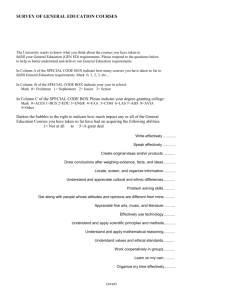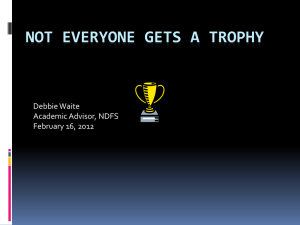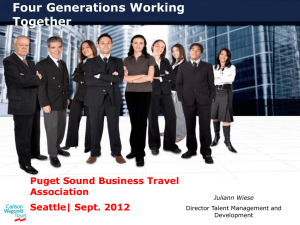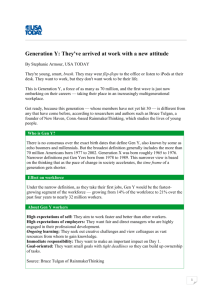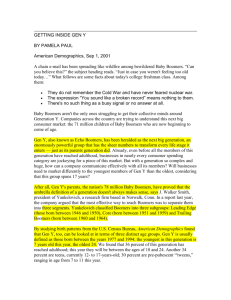Integrating Generation Y Into the Workplace
advertisement
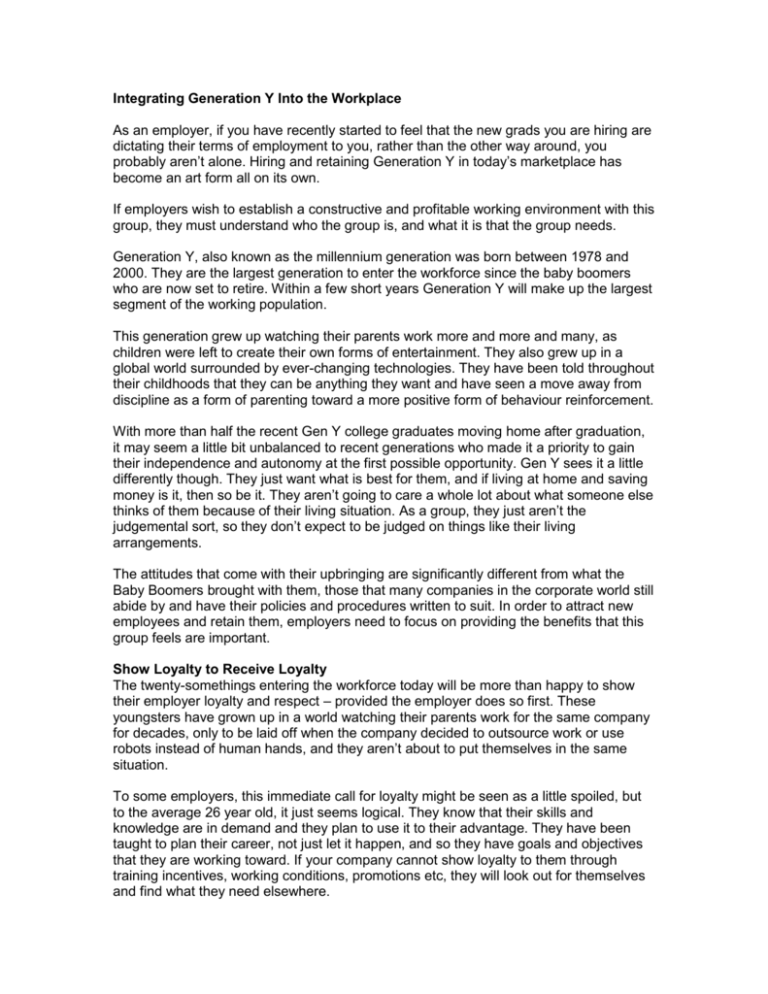
Integrating Generation Y Into the Workplace As an employer, if you have recently started to feel that the new grads you are hiring are dictating their terms of employment to you, rather than the other way around, you probably aren’t alone. Hiring and retaining Generation Y in today’s marketplace has become an art form all on its own. If employers wish to establish a constructive and profitable working environment with this group, they must understand who the group is, and what it is that the group needs. Generation Y, also known as the millennium generation was born between 1978 and 2000. They are the largest generation to enter the workforce since the baby boomers who are now set to retire. Within a few short years Generation Y will make up the largest segment of the working population. This generation grew up watching their parents work more and more and many, as children were left to create their own forms of entertainment. They also grew up in a global world surrounded by ever-changing technologies. They have been told throughout their childhoods that they can be anything they want and have seen a move away from discipline as a form of parenting toward a more positive form of behaviour reinforcement. With more than half the recent Gen Y college graduates moving home after graduation, it may seem a little bit unbalanced to recent generations who made it a priority to gain their independence and autonomy at the first possible opportunity. Gen Y sees it a little differently though. They just want what is best for them, and if living at home and saving money is it, then so be it. They aren’t going to care a whole lot about what someone else thinks of them because of their living situation. As a group, they just aren’t the judgemental sort, so they don’t expect to be judged on things like their living arrangements. The attitudes that come with their upbringing are significantly different from what the Baby Boomers brought with them, those that many companies in the corporate world still abide by and have their policies and procedures written to suit. In order to attract new employees and retain them, employers need to focus on providing the benefits that this group feels are important. Show Loyalty to Receive Loyalty The twenty-somethings entering the workforce today will be more than happy to show their employer loyalty and respect – provided the employer does so first. These youngsters have grown up in a world watching their parents work for the same company for decades, only to be laid off when the company decided to outsource work or use robots instead of human hands, and they aren’t about to put themselves in the same situation. To some employers, this immediate call for loyalty might be seen as a little spoiled, but to the average 26 year old, it just seems logical. They know that their skills and knowledge are in demand and they plan to use it to their advantage. They have been taught to plan their career, not just let it happen, and so they have goals and objectives that they are working toward. If your company cannot show loyalty to them through training incentives, working conditions, promotions etc, they will look out for themselves and find what they need elsewhere. Stimulate Thy Brain ‘Bored’ is not a word in the Gen Y dictionary. ‘Stimulation’ is though, and they like to feel like they are doing something worthwhile with their time. Mundane tasks, while they may be tolerated to some extent, are not what this group is looking for. If they are going to spend forty or fifty hours per week working, something that goes against their goals to begin with, then they better feel like they are contributing to something bigger while keeping their minds challenged and focused. All Work and No Play Makes Generation Y a Very Dull Group Sure work is a priority for this group - as their achievements can attest to, but when all is said and done, they also want a life outside the office where they can actually reap the benefits of all of their hard work. They’ve grown up watching their parents struggle to find time to do the things they love and they are not about to follow suit. Whether this means that your company has to offer a more flexible work schedule, additional vacation time, telecommuting opportunities, or provide more staff to get the job done in less time is up to you and your employees. But meeting or improving any of these conditions make jobs more appealing to your prospective employees. Socializing On Company Time If your company has a policy of restricting websites like Facebook, shutting down instant messenger services like MSN and Yahoo, or restricting personal emails, chances are that you are lessening the likelihood of Gen Yers sticking around. Growing up with computers, cell phones and being able to immediately upon impulse connect with friends and family around the world has made this group accustomed to keeping in touch at all times. The big concern among policy makers with regard to these type of activities is the loss of productivity by their employees. In the case of Generation Y however, the opposite may be true. These kids grew up with ever changing technology. They are talented at using it, and as a result have become efficient multitaskers. Restricting their use of such devices might only serve relay the feeling of distrust, which in turn makes a Gen Yer feel undervalued. They won’t be able to comprehend why they can’t use something if they are getting all of their work done in spite of it. In Touch With the Marketplace Don’t think that you can pull the wool over any Gen Y eyes. They are in touch. They know what everyone else is making, how many vacation days their friends get, and probably all about each other’s boss. If you try and short change one of these kids, they are going to figure it out. Paying them 10 thousand dollars per year less than your competitors will is a sure way for you to lose employees, and quickly. Mistakes like this are costly in the end, because as stated before, they are in touch, with EVERYONE, and soon the only applicants you’ll have are the ones that couldn’t get hired anywhere else. Little Things Make a Big Difference Do you invest in the good coffee or do you buy the cheapest brand you can find at the local bulk-food retailer? Do you demand that your employees be impeccably dressed in suits and ties every day? Do you discourage friendships and chatting within the workplace? Are you looking over your employee’s shoulders daily to ensure that they are performing tasks exactly the way you demand? As insignificant as some of these may seem, they can and do affect how your employees view your company. If you use the el-cheapo coffee, they probably don’t bother entertaining the idea of a raise any time soon because they view you as just too cheap. Friendships are another point. If there is no community created within the office, Gen Yers will seek it out elsewhere. They aren’t the types to spend their days in an unstimulating, stuffy office where jokes aren’t tolerated, idle chit chat is frowned upon and they are forced to conform to a strict dress code. The Technological Wizards Keep up with the latest technology. You probably won’t find a Gen Yer eager to turn off the cell phone, never mind one that will be willing to work on an old CRT monitor. If you don’t know what type of technology to upgrade to – no fear, the Gen Y group in your office will be more than happy to point you in the right direction. With current equipment, this group will get the job done faster and more precisely than you would have likely thought possible and they will be a whole lot happier doing so.



